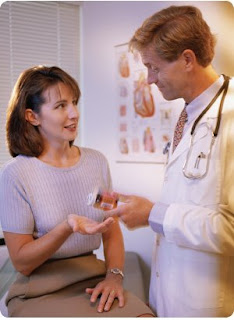 The following letter by Ed Jones was sent to the Chattanooga Free Press recently. I couldn't agree more with Mr. Jones.
The following letter by Ed Jones was sent to the Chattanooga Free Press recently. I couldn't agree more with Mr. Jones.I guess I know that I live in my own little bubble of my world and this again became apparent to me as I looked at the front page picture on the September 11, 2008 Chattanooga Free Press and saw the [accompanying photograph].
I tend to forget that the average Tennessean takes 18 prescription drugs per year since I deal with so many individuals who use natural therapies to maintain health instead of drugs; I was again stunned to see the reality of pharmaceutical prescribing. This is an article written by Free Press writer Emily Bregel about an 81-year old lady from Cleveland, Tennessee and what you see on her table is by my estimate 26 prescription drugs that she must take every day.
The article was entitled "Trapped in Medicare Gap." The focus of the article was on the high cost of prescription drugs on seniors but my focus is very different. The picture above represents an absolute crime when you consider the followings facts:
(1) 100,000 patients die every year from properly prescribed, properly taken prescription drugs.
(2) No one can determine the true interactions of drugs when you combine three or more at one time.
(3) The majority of drugs are not studied on elderly people.
(4) Most patients, such as this lady, probably have several physicians and each one has given her their choice of drugs without anyone ever removing an old drug.
(5) You know that she has to feel horrible each day with the use of this many drugs, not counting being financially destroyed.
This is sheer madness to me and yet the system endorses this type of medical prescribing. What I also found so fascinating is that in the same A section of the Free Press is an article on page A7 that talks about the medical community becoming more critical of drug companies. The following is the first paragraph of this article and I could not have said it better myself.
Just about every segment of the medical community is piling on the pharmaceutical industry these days, accusing drug makers of deceiving the public, manipulating doctors and putting profits before patients. Three top editors of the prestigious New England Journal of Medicine last month publically sided against the drug industry. The influence that the pharmaceutical companies, the for-profits, are having on every aspect of medicine... is so blatant now you'd have to be deaf, blind and dumb not to see it," said Journal of the American Medical Association editor Dr. Catherine DeAngelis.Dr. DeAngelis said we should all get together and say, "Enough!"
My final thought on this the following: Health professionals practicing today have almost zero concept of true healing and the absolute effectiveness of safe nutritional therapies and diet change, especially on the elderly. They can dismiss nutritional supplements as untested, unsafe, not approved or any other wording they want but the truth is that research now bears out that nutrition therapy is truly safe, effective and low cost.
Anyone who doubts the research on nutrition and disease, simply go to www.vitasearch.com and you will find thousands of peer reviewed double blind studies to support every aspect of disease with nutrients. Lack of knowledge is no excuse for poorly managing people's chronic health conditions with excessive drugs when safe and effective nutritional therapies and dietary recommendations are available.
— Ed Jones
Complementary Medicine | Natural Health | Nutrition | Herbal Supplements | Nutritional Supplements | Dr. David Ross, ND, CNHP | DrDavidRoss.com












